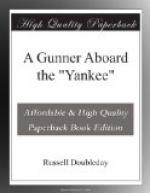We were glad enough to get two bags, yet we almost gnashed our teeth when we thought of the eight fat pouches that were chasing us around the island of Cuba.
The mail was brought to the wardroom and dumped out on the table for the commissioned officers to sort and pick out their own letters. A news-hungry group stood the while at the doors, watching and mentally grumbling that such an awfully long time was being taken to accomplish so simple a thing.
Finally the master-at-arms was sent for and the worth-its-weight-in-gold mail turned over to him to distribute. To the gun deck poured the eager throng. The master-at-arms backed up against the scuttle-butt for protection, then shouted out: “Let one man from each mess get the mail; the rest of you stand off, or you won’t get any till to-morrow.” The rest of us stood to one side then, realizing that time would be thus saved.
“Jimmy Legs” called out the names, and the representatives of the different messes took them. We heard Kennedy’s name called, and a murmur of sympathy spread around. “Poor chap,” said one, “he would give the use of his wounded arm for that letter.”
“Yes,” said another; “he has to suffer homesickness as well as pain, and a letter from home would brace him up as nothing else could.”
Every man took his treasures to a quiet place, a place apart, if such could be found, to enjoy them alone. The few who got none—well! may I never see such disappointed, sorrowful faces again.
The letters read and pondered over awhile, tongues began to be loosened, and soon all over the ship was heard the buzz of conversation. Chums told each other the little items of news that to them seemed the most important things in the world. And after all had been told and retold, the men gathered in groups and discussed their past months’ experiences.
“Do you know,” said Craven (a descendant of that famous line of naval heroes, a seaman and member of Number Thirteen six-pounder gun’s crew), “I think we are wonderfully fortunate to come through this experience as well as we have. Just think! We have been under fire five times, and only one man has been injured. Why,” he continued, and his hearers nodded assent, “I used to have the most awful visions—thought I saw the men lying round our gun in heaps, while fresh ones jumped to take the places of the fallen.”
“And they would,” said messenger “Hop,” who happened to be passing on his way aft to deliver an order.
The “Yankee” had seen some spirited fighting, though most of her crew had anticipated nothing more exciting than patrol duty.
Moreover, it was almost certain that we had not seen the end of active service. At present, however, the crew settled down once more to the monotony of ship life in port—which is about equivalent to garrison duty for a soldier.




